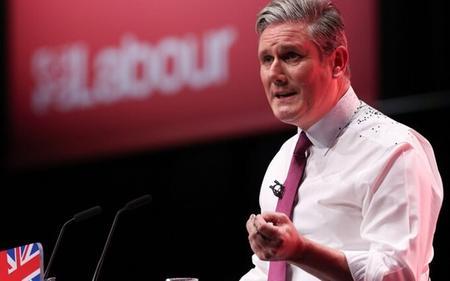Dispatches from the party conferences – Labour Party

‘Let’s get Britain’s future back’ was the message of the weekend as the Labour Party decamped to Liverpool to rally before a momentous election year.
In the final instalment of our conference series, BIA Policy and Public Affairs Executive Herbie Lambden shares insights from Labour Party Conference.
Buoyed though they are by recent polls, Labour resisted the urge to celebrate prematurely at their conference this month. Instead, Keir Starmer charted a path to power by providing a clearer picture of Labour’s policy programme.
Batting off a protestor, Starmer used his speech to pledge 1.5 million new homes, a National Wealth Fund to invest in industry and infrastructure, and ‘long-term stability for researchers, investors, innovators’ in the life sciences. He referenced Labour’s three election victories of 1945, 1964, and 1997, comparing the challenge before his party to the sum of all three.

Labour Leader Keir Starmer addresses Labour Party Conference.
Health was a theme that ran through Conference. Expanding on Stamer’s promise to ‘get the NHS back on its feet’, Shadow Health Secretary Wes Streeting reaffirmed his commitment to true reform of the NHS, calling it ‘even more important than investment’ in his speech. Prevention and AI integration will form a large part of what Labour mean by reform.
Starmer and Streeting weren’t alone in referring to UK life sciences as an area of national strength; Shadow Chancellor Rachel Reeves called for planning reform to fast-track lab development. It was encouraging to hear support for the life sciences as a growth sector as well as a source of health innovation, especially from a Shadow Chancellor who has avoided over-promising investment in line with Labour’s ‘iron-clad fiscal rules’.
Newly appointed Shadow Science Secretary Peter Kyle also took to the stage, describing the life sciences as the ‘crown jewel of our science sector’. Kyle called for a 10-year funding settlement for R&D and a new ‘founder track’ to allow university spinouts to keep a higher stake of their equity. Speaking at a fringe event, the Shadow Science Secretary said Labour would take a ‘progressive’ approach to the regulation of emerging technologies like AI.
While some policy detail remains hazy, Labour used their conference to set out their stall to the electorate. Toeing the party line of emphasis on industrial strategy and long-termism, the Shadow Cabinet presented a unified front while eschewing the ‘government-in-waiting’ label thrust upon them by some commentators.
The BIA was out in force representing our sector across the conference. Our CEO, Steve Bates, attended various private roundtables and receptions, where interest in life sciences from Labour MPs was high, particularly on the MHRA and regulatory environment, Horizon Europe and pensions reform.

Speakers on a BIA panel held at the Museum of Liverpool (L-R): Will Milligan (Extracellular), Ros Le Feuvre (University of Manchester), Paul Blakeley (TBI), Jacob Nathan (Epoch Biodesign)
The BIA hosted a fringe event exploring how a Labour government would support the growth of emerging technologies like engineering biology, asking ‘Can biotechnology save the world?’. Recognising the UK’s strengths in academia and R&D, panellists agreed that funding and support for scale-up will be key if we are to keep pace with the US in this growing field. The panel also referenced the importance of IP and tech transfer for spinouts, echoing Peter Kyle’s aforementioned calls for a ‘founder track’.
The climate-focused, mission-driven nature of BIA members Extracellular and Epoch was clear to the audience, but the interdisciplinary innovation taking place in engineering biology will require understanding and support across government. By seizing this opportunity, Labour could cement the UK’s status as a world leader in the bioeconomy, putting sustainable products in the hands of British consumers before anyone else.
Reflecting on this conference season as a whole, nobody could deny that we are in the early stages of an election campaign. The UK’s life science sector is larger, better understood, and more visible than at any previous election. We therefore have a real opportunity to get forward-looking, pro-innovation policies into party manifestoes to secure continued growth for the sector and the wider economy.
The BIA will continue to keep you updated on goings on in Westminster and beyond as we head into a busy twelve months for life sciences policy.
More news and updates





